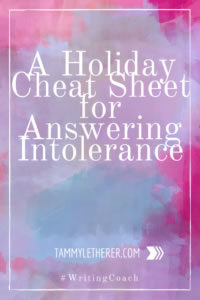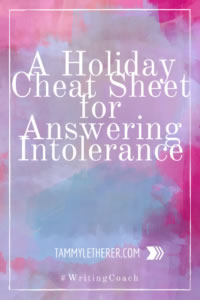 I’ll never forget the day, many years ago, when I discovered the benefits of “scripting” life’s difficult moments. My kids went to school some distance away. A friend told me that one of our neighbors was going to ask me to carpool with her and I didn’t want to. I was worried about being steam-rolled into an arrangement that, in my gut, I knew would include a lot of drama. But what would I say? What reason could I give?
I’ll never forget the day, many years ago, when I discovered the benefits of “scripting” life’s difficult moments. My kids went to school some distance away. A friend told me that one of our neighbors was going to ask me to carpool with her and I didn’t want to. I was worried about being steam-rolled into an arrangement that, in my gut, I knew would include a lot of drama. But what would I say? What reason could I give?
My friend fed me the perfect line. She told me to say, “I just can’t. I’ve got a lot on my plate right now.”
Soon after, in front of a group of moms, the neighbor sprung her request on me. Had I not been prepared, I would have simply gulped and given in, too embarrassed to be seen as disagreeable in public. But my response was at the ready. It rolled from my tongue, landed confidently, and I was free!
Ever since, I’ve found that most situations can be navigated gracefully by simply taking some time to prepare. I’ve learned to tuck a few “no’s” into my back pocket, so to speak, in the same way I might tuck Kleenex into my purse.
This practice can also work when it comes to answering intolerance and racism.
We’ve likely all been struck dumb when faced with unexpected racial slurs or off-color jokes. I was laughing about something with an acquaintance when he made a remark about “black people and watermelon.” Before I knew it, he had walked away and I was still standing there with a frozen grin on my face.
My pastor told the story this week of being at a dinner party with her son, who is biracial. She said a man took of photo of her son with three other teenagers and then loudly asked him, “What’s it like getting your picture taken with three white girls?” She was horrified but said nothing.
It’s normal to need time to process before reacting. But too often we miss the window of opportunity to express ourselves and are left holding a bag full of discomfort, disgust, guilt, and a feeling of complicity.
So how can we be prepared when the moment comes to speak up against words or actions we know aren’t right?
We need to make a cheat sheet, or script, of graceful but powerful responses to intolerance. And since many people will be talking turkey more than eating it across divided tables this holiday, here are a few suggestions to prepare you. (Thanks to my kids for contributing their finely-tuned sense of justice to this list.)
- Wow, that’s an insensitive comment.
- That remark makes me really uncomfortable.
- That’s not cool, dude!
- Wait. Do you really believe that?
- Please don’t talk that way around me.
- That’s how stereotypes get perpetuated.
- Are you aware that what you said is insulting to that group?
What can you add to this list? Please share your ideas and together let’s arm ourselves against those moments of shocked silence. Because neutrality is no longer an option.








